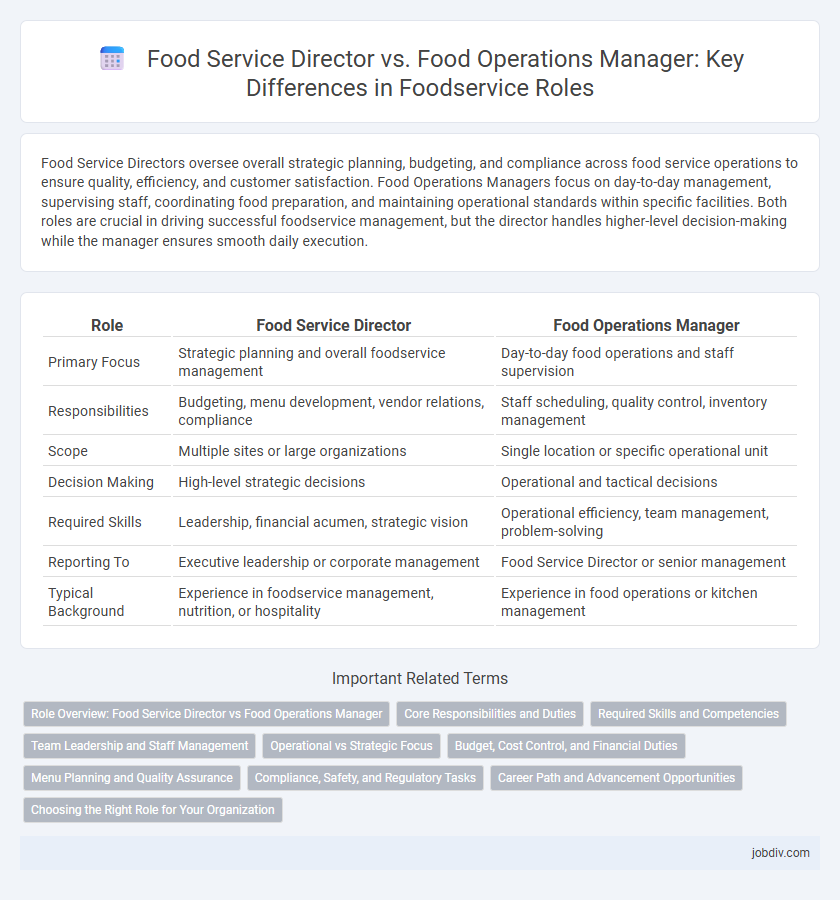Food Service Directors oversee overall strategic planning, budgeting, and compliance across food service operations to ensure quality, efficiency, and customer satisfaction. Food Operations Managers focus on day-to-day management, supervising staff, coordinating food preparation, and maintaining operational standards within specific facilities. Both roles are crucial in driving successful foodservice management, but the director handles higher-level decision-making while the manager ensures smooth daily execution.
Table of Comparison
| Role | Food Service Director | Food Operations Manager |
|---|---|---|
| Primary Focus | Strategic planning and overall foodservice management | Day-to-day food operations and staff supervision |
| Responsibilities | Budgeting, menu development, vendor relations, compliance | Staff scheduling, quality control, inventory management |
| Scope | Multiple sites or large organizations | Single location or specific operational unit |
| Decision Making | High-level strategic decisions | Operational and tactical decisions |
| Required Skills | Leadership, financial acumen, strategic vision | Operational efficiency, team management, problem-solving |
| Reporting To | Executive leadership or corporate management | Food Service Director or senior management |
| Typical Background | Experience in foodservice management, nutrition, or hospitality | Experience in food operations or kitchen management |
Role Overview: Food Service Director vs Food Operations Manager
The Food Service Director oversees overall food service strategy, budget management, and compliance with health regulations, ensuring high-quality customer experiences. The Food Operations Manager focuses on daily operational efficiency, staff coordination, inventory control, and workflow optimization within the food service environment. Both roles are essential for aligning strategic goals with operational execution in the foodservice industry.
Core Responsibilities and Duties
Food Service Directors oversee strategic planning, budgeting, and compliance to ensure efficient foodservice operations while managing staff performance and customer satisfaction. Food Operations Managers focus on daily operational management, including inventory control, quality assurance, and coordination between kitchen and front-of-house teams. Both roles prioritize regulatory adherence and optimize resource allocation, but directors emphasize long-term goals whereas managers handle immediate operational execution.
Required Skills and Competencies
Food Service Directors require strong leadership, budgeting expertise, and strategic planning skills to oversee large foodservice operations and ensure regulatory compliance. Food Operations Managers need proficiency in day-to-day operational management, staff supervision, and inventory control to maintain efficient service delivery and quality standards. Both roles demand excellent communication, problem-solving abilities, and knowledge of food safety regulations to drive successful foodservice management.
Team Leadership and Staff Management
Food Service Directors oversee strategic planning and set performance standards to drive large-scale team leadership, ensuring efficient coordination among multiple kitchen and service units. Food Operations Managers focus on hands-on staff management, supervising daily workflows, training employees, and maintaining compliance with health and safety regulations. Both roles require strong leadership skills, but the director emphasizes long-term goals while the manager handles immediate operational staff guidance.
Operational vs Strategic Focus
A Food Service Director primarily focuses on strategic planning, including budgeting, menu development, and compliance with health regulations to ensure overall organizational goals are met. In contrast, a Food Operations Manager emphasizes operational execution, overseeing daily kitchen activities, staff management, and supply chain logistics to maintain efficient service delivery. Both roles are critical, with the Director shaping long-term vision while the Operations Manager handles tactical implementation.
Budget, Cost Control, and Financial Duties
Food Service Directors oversee overall budgeting and financial strategy, ensuring the alignment of foodservice operations with organizational goals to maximize profitability. Food Operations Managers focus more on daily cost control, including inventory management, labor costs, and vendor negotiations to maintain efficient expenditure. Both roles require strong financial oversight but differ in scope, with Directors handling broader fiscal planning and Managers managing operational budget execution.
Menu Planning and Quality Assurance
Food Service Directors oversee strategic menu planning to align with nutritional standards and customer preferences, ensuring diverse and balanced offerings. Food Operations Managers focus on implementing quality assurance protocols during food preparation and service, maintaining compliance with health regulations and consistent taste. Both roles collaborate to optimize menu execution while sustaining high food quality and safety standards.
Compliance, Safety, and Regulatory Tasks
Food Service Directors oversee compliance with health codes and regulatory standards across multiple sites, ensuring comprehensive food safety protocols are implemented and maintained. Food Operations Managers focus on daily operational adherence, directly managing safety inspections, staff training on hygiene practices, and real-time regulatory compliance. Both roles collaborate to uphold stringent safety measures, but the Director sets strategic compliance policies while the Operations Manager executes and monitors them on the ground.
Career Path and Advancement Opportunities
Food Service Directors typically oversee multiple foodservice locations or large-scale operations, focusing on strategic planning, budgeting, and compliance, which positions them for executive roles like Regional Manager or VP of Food Services. Food Operations Managers manage daily activities within a single facility, honing skills in staff supervision, inventory control, and customer service, providing a pathway to directorship or specialized management roles. Advancement opportunities favor Food Service Directors due to their broader scope of responsibility and leadership experience, essential for senior management positions in the foodservice industry.
Choosing the Right Role for Your Organization
A Food Service Director typically oversees strategic planning, budgeting, and compliance across multiple units, making them ideal for larger organizations with complex foodservice operations. In contrast, a Food Operations Manager focuses on day-to-day management, staff coordination, and operational efficiency, suited for single-location establishments seeking hands-on leadership. Selecting the right role depends on organizational size, strategic needs, and the level of operational control required to optimize foodservice performance.
Food Service Director vs Food Operations Manager Infographic

 jobdiv.com
jobdiv.com